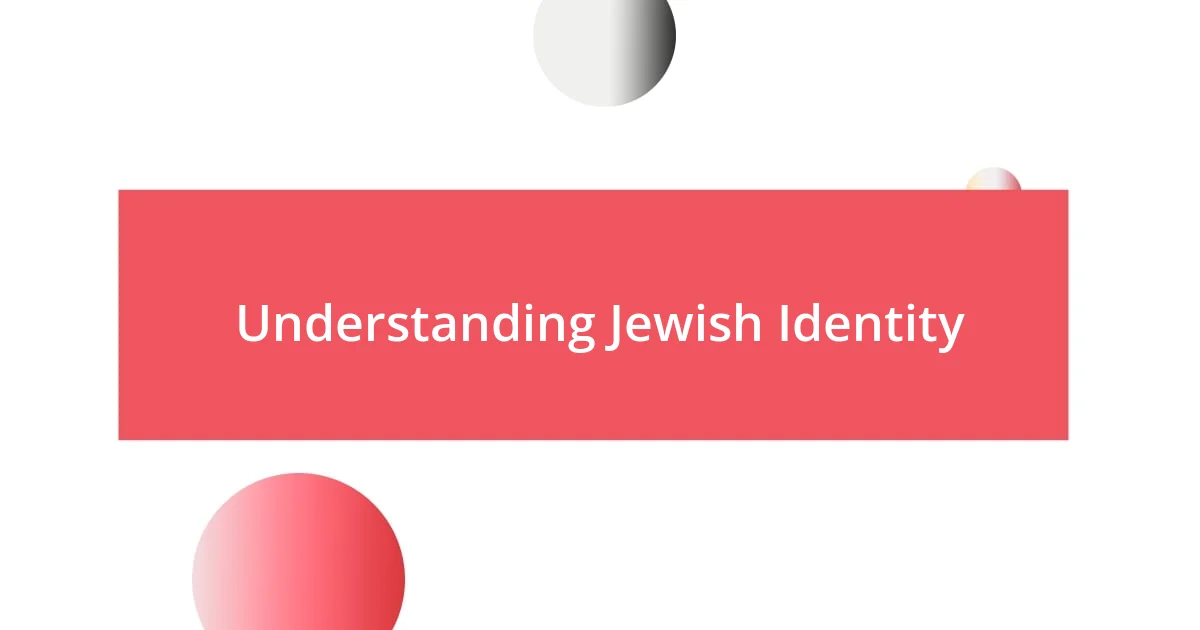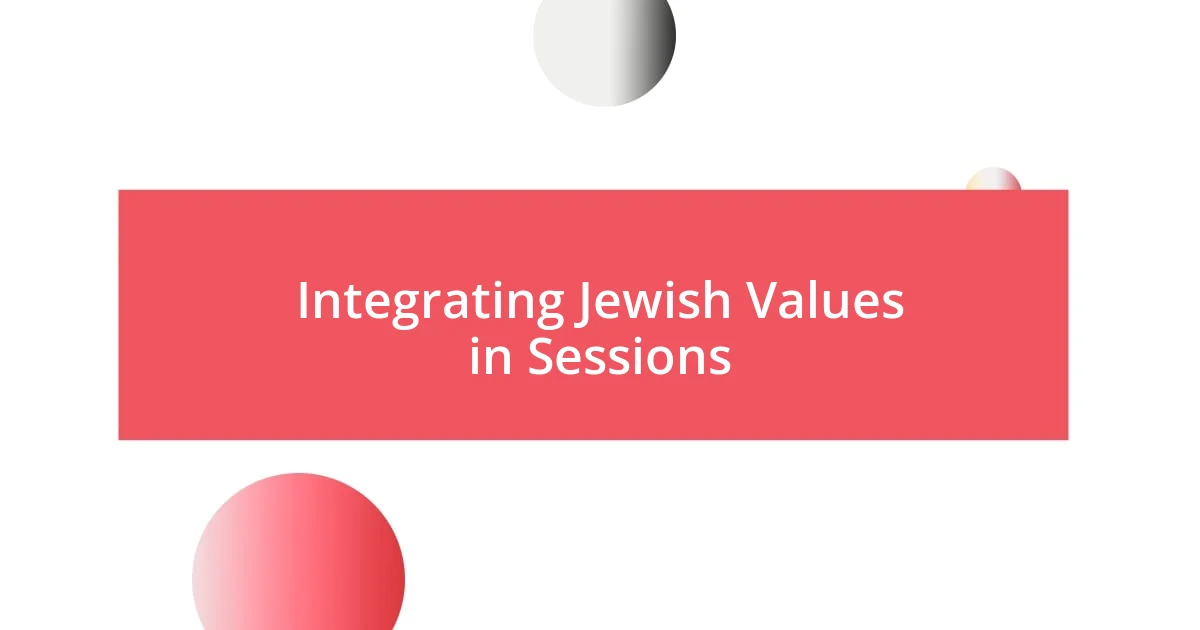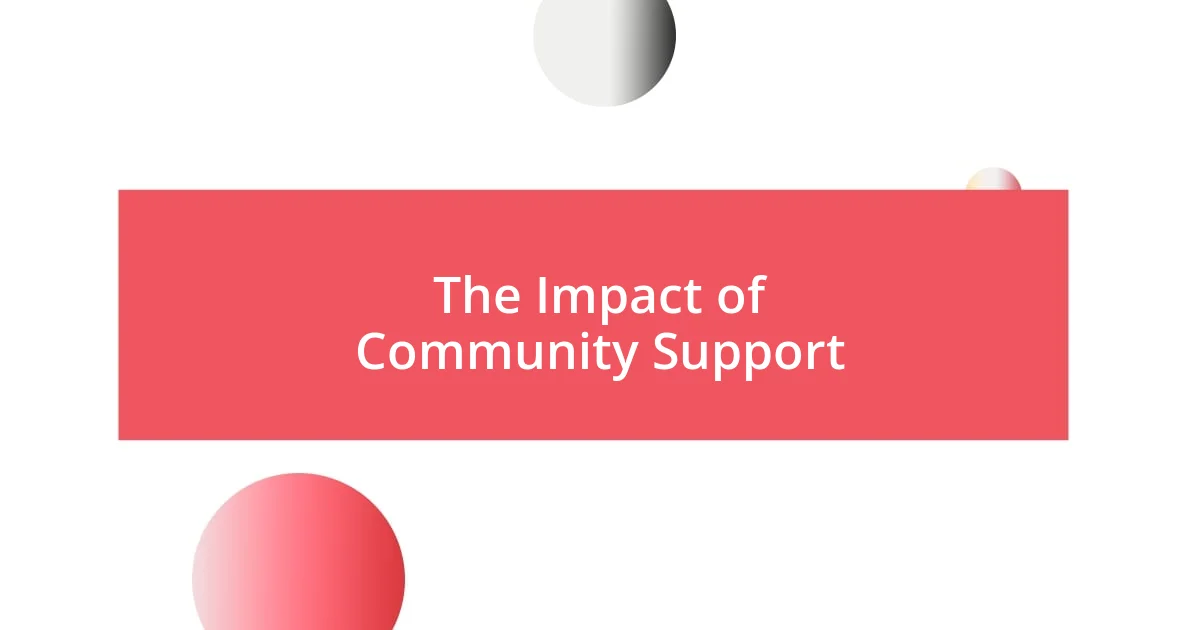Key takeaways:
- Jewish identity is a multifaceted journey shaped by cultural heritage, traditions, and community, which significantly influences personal growth and therapeutic experiences.
- Integrating Jewish values and rituals in therapy enhances self-exploration, fosters a sense of belonging, and promotes emotional resilience through shared narratives and communal support.
- Finding a therapist with an understanding of Jewish identity can deepen the therapeutic process, validating cultural context and facilitating a stronger connection to one’s heritage.

Understanding Jewish Identity
Understanding Jewish identity is a deeply personal journey, often rooted in tradition, community, and faith. I remember sitting at my grandmother’s table during Shabbat, the warm aroma of challah in the air, and feeling a profound connection to generations before me. It made me ask myself, what does it truly mean to belong to this lineage?
For many, Jewish identity isn’t just about religious practices; it’s woven into the fabric of everyday life, shaping our values and perspectives. I’ve often found myself reflecting on how my cultural background influences my worldview, especially in therapy. It raises an intriguing question: How do our shared narratives shape our individual experiences?
The experience of being Jewish can encompass a wide variety of beliefs and customs, creating a mosaic of identities. I’ve spoken with others who share this feeling of complexity — sometimes it’s exhilarating, and other times it’s overwhelming. Isn’t it fascinating how one identity can hold such diverse meanings? This exploration provides a rich tapestry to navigate in therapy, as we unravel who we are in the broader context of our heritage.

Therapeutic Approaches to Identity
Therapeutic approaches to identity can be transformative, especially for those navigating the rich landscape of Jewish heritage. I often engage with narrative therapy, where we explore and reconstruct personal stories to understand how cultural history shapes individual identity. This approach resonates with me; I recall a session where unraveling a family story about resilience during a challenging time deepened my appreciation for my ancestors and their struggles.
- Cultural Storytelling: Sharing cultural stories can unveil hidden strengths and values.
- Mindfulness-Based Practices: These help in connecting with traditions, like reflecting on the significance of Shabbat.
- Expressive Arts Therapy: Using art to express Jewish identity allows for creativity and exploration beyond words.
- Cognitive Behavioral Therapy (CBT): This focuses on recognizing and challenging negative beliefs tied to identity, fostering a healthier self-image.
Incorporating valuable insights from my own therapy journey, I’ve realized that discussing these traditional elements doesn’t just help in grounding my identity; it expands my understanding of self within the broader Jewish community. There’s something profound about recognizing the interplay between personal growth and my cultural background; it’s a powerful catalyst for healing.

Exploring Traditions and Practices
Exploring Jewish traditions and practices can greatly enhance one’s understanding of identity. When I think about the rituals of Passover, I remember the first time I helped my family prepare the Seder plate. Each item represented a piece of our history and a reminder of resilience. These moments not only connect me to my heritage but also offer comfort during difficult times, reinforcing the idea that my past plays an essential role in my present.
Another tradition that resonates with me is the lighting of the menorah during Hanukkah. I recall sitting with my friends and lighting the candles, each flame symbolizing hope and perseverance. Sharing these rituals can often evoke deep emotional responses, allowing us to reflect on what it means to belong to a community with shared values. This practice isn’t just about following customs; it’s about recognizing the threads that weave our stories together, enriching the therapeutic process.
Additionally, Shabbat invites a weekly pause filled with rest and reflection. I cherish the quiet moments spent with family, reciting prayers and enjoying shared meals. These practices create a space for introspection and connection, reinforcing the importance of balance in life. Embracing these traditions in therapy opens up discussions about how they shape our identities and foster a sense of belonging that is so crucial for emotional well-being.
| Tradition | Significance |
|---|---|
| Passover | Represents liberation and resilience, fostering connection to history. |
| Hanukkah | Symbolizes hope, community, and perseverance through shared rituals. |
| Shabbat | Encourages rest and reflection, emphasizing balance and family connection. |

Integrating Jewish Values in Sessions
Integrating Jewish values into therapy sessions offers a unique lens through which to explore personal experiences. I’ve found that when we discuss concepts like tikkun olam—the idea of repairing the world—it sparks meaningful dialogues about responsibility and community. Have you ever paused to consider how your actions can contribute to something greater? For me, reflecting on this ideal often motivates deeper self-exploration.
Another vital aspect is the emphasis on communal support, deeply rooted in Jewish tradition. In my therapy sessions, I’ve shared experiences about my local synagogue, where the warmth of community is palpable. Just recalling the love and encouragement I received during tough times brought tears to my eyes. Isn’t it comforting to know that we are not alone in our struggles? When therapists encourage exploring supportive networks, it opens up avenues for healing and growth that transcend individual therapy.
Additionally, holiday customs like keeping kosher or celebrating Shabbat can lead to profound conversations about personal values and boundaries. I recall a particularly reflective session where I discussed what keeping kosher signifies for me—not just dietary restrictions, but a commitment to mindfulness in daily life. How do your traditions shape your choices? My experience has shown that these discussions can illuminate pathways to a more authentic self, reinforcing the significance of our values in forging identity.

The Impact of Community Support
Community support plays a pivotal role in embracing Jewish identity. I remember during one particularly challenging year, my synagogue offered a support group for those going through similar struggles. Just hearing others share their stories helped me realize that I wasn’t facing my challenges alone. Have you ever experienced that comforting sense of belonging when surrounded by people who truly understand you?
The warmth of community cannot be overestimated. I think back to attending Shabbat dinners, where the room buzzed with laughter and shared experiences. Those gatherings weren’t just dinners; they were lifelines. They reminded me that our collective joy and sorrow form the cornerstone of who we are as individuals within a larger tapestry. It’s fascinating how these moments provide a sense of solace, encouraging us to dig deeper into our identities.
Moreover, the communal engagement during Jewish holidays can be profoundly impactful. I fondly recall the way our entire community came together for Yom Kippur, each person reflecting on their past year and seeking forgiveness. There was a tangible energy in the air, a beautiful reminder that we’re all on a journey of seeking growth and healing together. Isn’t it inspiring to think about how our communal rituals unify us and foster emotional resilience? Experience has taught me that these connections are vital; they offer a safe space to explore our Jewish identities while being supported by those who share our heritage.

Finding a Therapist with Expertise
Finding a therapist with expertise in Jewish identity can feel like searching for a kindred spirit. I vividly remember the first time I met a therapist who understood the nuances of my cultural background. As we discussed my experiences growing up, I felt an immediate sense of relief—having someone who knew not just the traditions, but the emotional landscapes attached to them made a world of difference. Have you ever felt that profound connection with someone who just gets it?
Seeking a therapist who aligns with my Jewish values was a game-changer. After an initial consultation, I shared an anecdote about my Bat Mitzvah experience—how it represented not just a rite of passage, but a deep commitment to my community and self. I loved how my therapist not only acknowledged the significance of that moment but also encouraged me to explore its long-lasting impacts on my identity. It was refreshing to know that my cultural context mattered in the therapeutic process.
Not all therapists are well-versed in cultural nuances, which is why I always recommend asking potential therapists about their experience with Jewish clients. During my own search, one therapist pointed out how Jewish teachings can serve as a source of strength in facing life’s challenges. That small statement resonated with me—has anyone ever validated the connection between your cultural beliefs and your personal growth? A great therapist can foster not only healing but also pride in your heritage, providing a safe space to embrace all facets of your Jewish identity.















